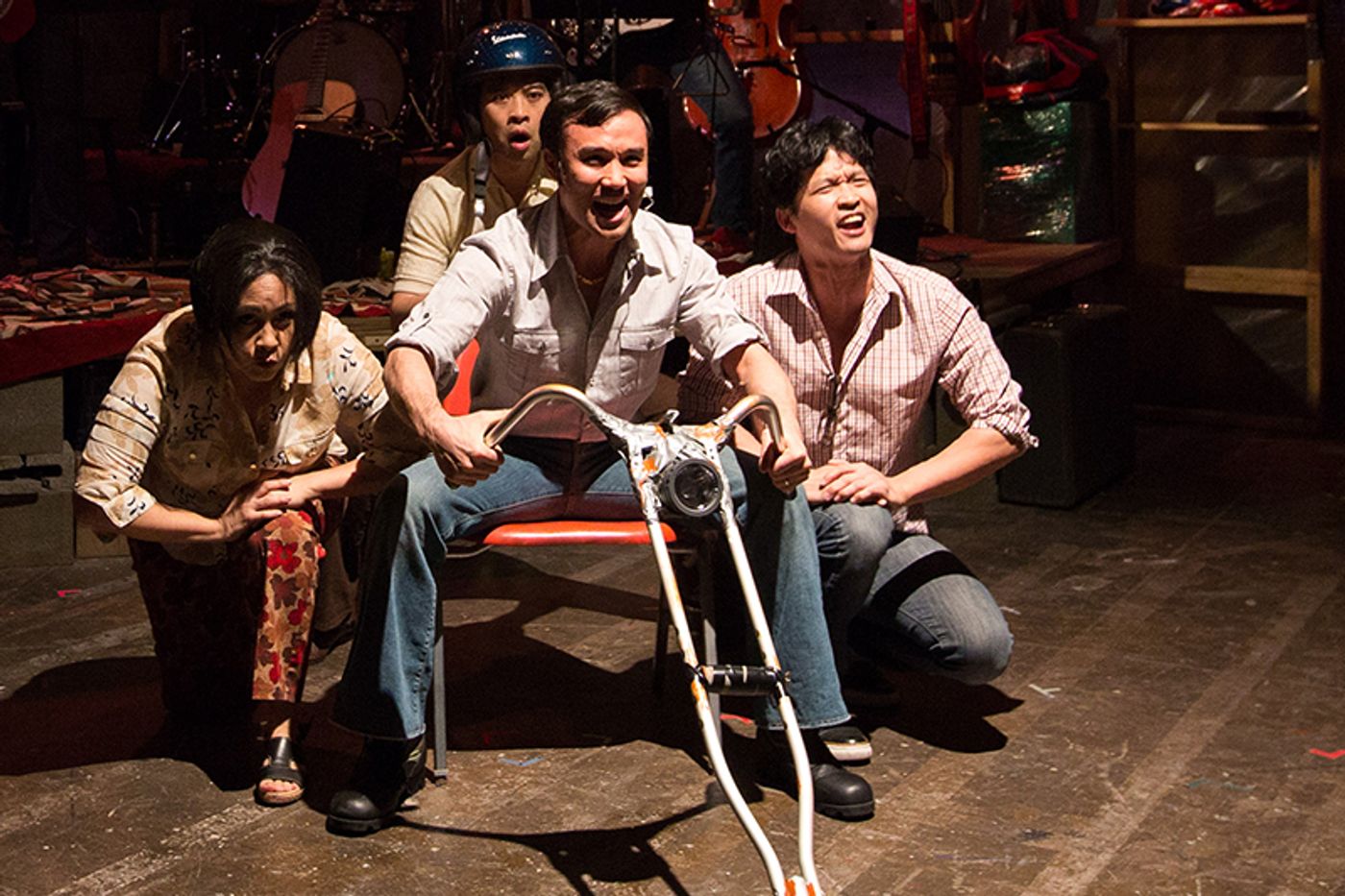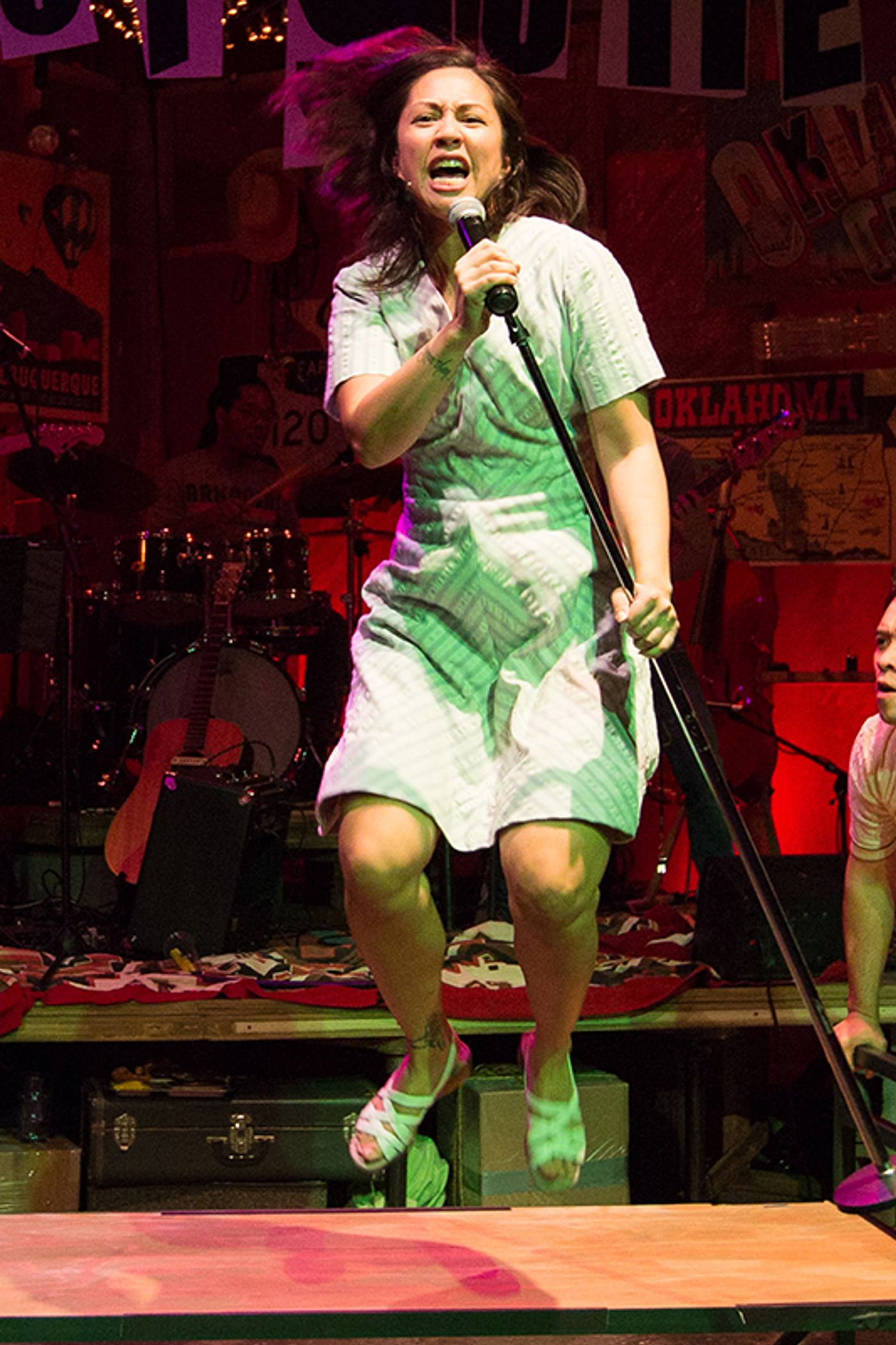Feature: VIETGONE at Studio Theatre, a Play for This Moment

The preshow speech of VIETGONE is spoken by the playwright, in which we learn that the play is a love story of how Mom and Dad got together. We also learn that the Vietnamese characters will speak like action heroes/Joss Whedon archetypes and that the Americans will speak... Well, some of it will be words. As Marc DeLaCruz, who plays Quang, the playwright's father, says, "The characters speak and relate to each other as many young Americans today despite the fact that they are Vietnamese and it's 1975... Also, the play is hilarious in an "omigosh I can't believe they went there" kind of way." Instantly, we are aware that the universe of VIETGONE is a one of a kind place. Director, Natsu Onoda Power, elaborates: "...it allows audience to perceive "Vietnamese" characters NOT as the "other"; it is so rare. (In this play, "American" is the other)." Regina Aquino, who plays Tong, the playwright's mother, adds, "From the very first page I was immediately impressed by Qui's flipping of the stereotype script... doing to the Americans what is done to Asian characters in film/tv/theatre all the time. It was shocking and I was totally in love with how subversively clever the writing was throughout the entire play."
.jpg?format=auto&width=1400)
VIETGONE will go on to embrace and test the boundaries of this conceit and Power and her team will push it even farther, with delaCruz noting, "Qui's distinct style and humor is woven so tightly into the script that there is enough of that structure to rely upon but still room for the people in the rehearsal room to play." Aquino adds, "Natsu gave us so much freedom to explore and follow impulses for jokes and gags, then she honed in the bits for each scene. Really, nothing was too ridiculous and it was SO MUCH FUN to rehearse." Pressing the physical gags into borderline insanity at times, allows the audience to let go of all preconceived notions and fall headlong into the specifics of this story and into an unexpected empathy. "It isn't a question of "balance," it is a question of simultaneous existence," Power clarifies. "Humor in this play is NOT an escape, it is weapon. Having lost everything else, that's what the characters use, desperately, to recover from trauma. These characters do not wallow. They survive the unthinkable with humor, sex, anger, and love."
Certainly, most of this is not in alignment with a typical expectation for a play about refugees during the Vietnam War. As Quang says near the end, if that's what you want, go to the movies. "The play certainly doesn't shy away from the realities and atrocities of war," says delaCruz, "but I think its brilliance lies in the fact that it doesn't necessarily feel heavy. Qui has found a way to tell a story that makes people laugh, maybe makes them uncomfortable and still ultimately says something about war, conflict and loss." What results from this destruction of the norm in VIETGONE is a humanization of what has become a caricature in American history. A prime example comes when Quang and his best friend discuss black/white relations as they see them, only to note their own prejudice against the Chinese. Power points out that, "...In every Asian culture there is A LOT of prejudice against "other Asians." And ironically, as Quang says, "Americans can't tell the difference anyway." ...It also points out that while we are quick to accuse others for having prejudices, our own biases remain invisible or "justified." By the way, I can't always tell a Japanese person from a Korean person from a Chinese person either," she adds, "so it's not like Americans are being especially ignorant. ...I am constantly mistaken for Deb Sivigny (a DC designer and member of The Welders)! I am honored of course, but Deb and I look nothing alike... It's not the matter of us looking similar; it is the matter of Asian being our primary marker. People think, oh, that person is Asian. She must be Deb." De la Cruz notes that no group can claim to be free of prejudice and that, "Somehow we're taught at some point in our lives to hate or fear another group of people... It's like this circle that keeps going around and around. I don't think we have to look far to see where this is going on today."

In opening our eyes to the universality of racial relations and the American perspectives on race, our viewpoint on the Vietnam War and Vietnamese people can shift. Power reflects on visiting the Vietnam War Memorial and seeing her reflection in the names on the monument. "This was a powerful reminder of the particular ways in which most Vietnam War narratives have been crafted: to emphasize and identify with the Americans... We are entering a new era, when the children of the first-generation Vietnamese, who grew up with English as their first language, are producing narratives to tell their parents' stories." "You're watching the dynamics of these relationships but in the back of your head you're remembering that these characters are refugees of a war and immigrants new to America who've all suffered unimaginable loss," reminds de la Cruz. "Part of the beauty of VIETGONE is the balance of all these things and it's ability to take characters that for many Americans might seem un-relatable and make them completely relatable." At a time when the lines between American ideological factions seem to be widening instead of closing, art like this piece can assist in closing these wounds.
More directly, playwright Qui has given the Vietnamese community a gift of representation. "Representation matters. I have never seen a play written, directed, composed, and performed entirely by Asian Americans. Why is that?" asks Aquino. "It is a rare joy that I don't know I will ever have the opportunity to participate in again." There is a delightful blossoming in DC of plays spotlighting Asian culture and Asian performers at the moment, with VIETGONE arriving just on the heels of Rorschach Theatre's 410-GONE and Mosaic Theatre Company's PAPER DOLLS, as well as the upcoming film, "Crazy Rich Asians". Aquino reminds us, "Asian men are leading men, full of swag, charm, and passion. Asian women are independent and outspoken and driven and sexually dominant. Asians are funny and loving and tender and vulnerable." The characters populating VIETGONE are the full rainbow of humanity and delaCruz says, "As an Asian American and actor of color, this is empowering and I thank Qui for giving us this opportunity to be the badasses we don't often get to be."

"At the very least," says Power, "every time it is performed, there are 100+ people who have gathered in a room to see Asian actors in strong leading roles, laughed, cringed, awwwww-ed, and cried together." This is the unifying power of art and of the theatre. When we share emotions and stories with other humans, the result is growth. Power adds, "My only complaint (which is not even a complaint) is that because it is, um, "R-rated," it is unlikely to be the "very first Vietnam War narrative" for a young person to encounter. Wouldn't that be amazing?"
You can still hurry and catch VIETGONE by Qui Nguyen, directed by Natsu Onoda Power, at Studio Theatre until May 20th. Featuring Marc delaCruz, Regina Aquino, Joe Ngo, Jacob Yeh, and Eileen Rivera.
Videos

